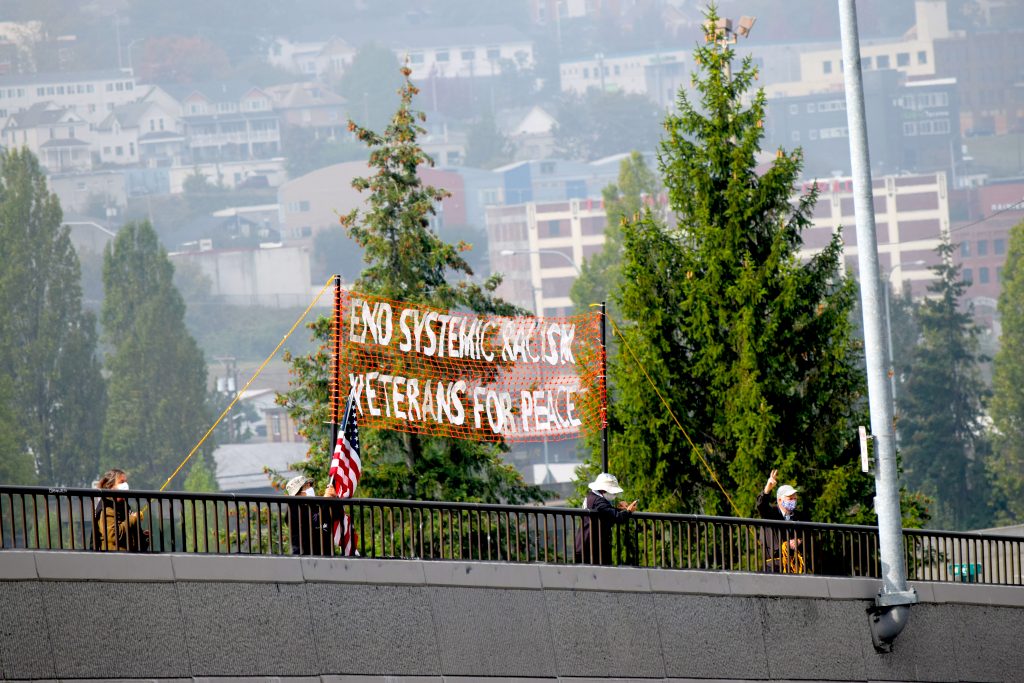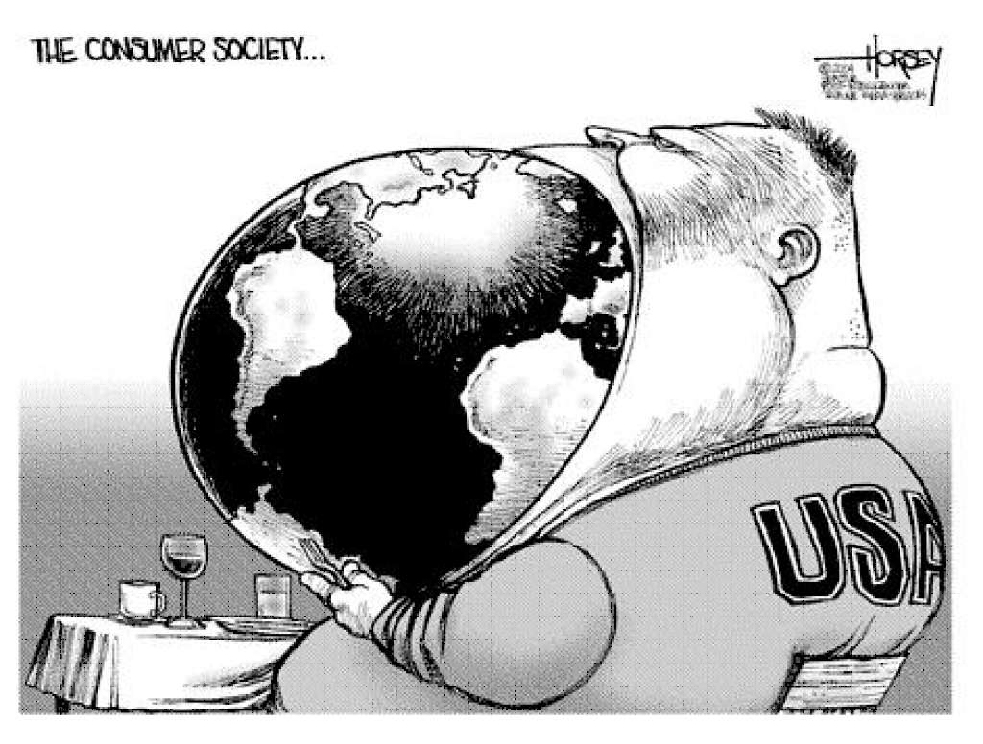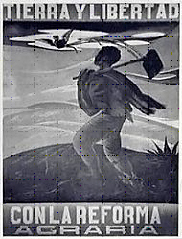Freeway Bannering Post-Insurrection

by Kristi Nebel
I wasn’t thinking deeply about the implications of my actions today before heading out to the McKinley Street Bridge to banner with Veterans for Peace. Except of course in that the Proud Boys, QAnon, Boogaloo, and Patriot Prayer have occasionally given me the heebie-jeebies in the eight months since we started doing this. They haven’t yet directly attacked us, though. It was a cool, rainy and slightly breezy day which could have discouraged the prospect of even trying to get the very pliable plastic to extend tightly enough to make the huge Tyvek letters visible over the six lanes of the freeway with the words “END SYSTEMIC RACISM / VETERANS FOR PEACE”. But we keep doing it whenever possible, so l got out there with one side of the sign pulled tight from a rope tied around my middle, and began to meditate about the veteran woman who was shot while breaking into the State House. She’s been lionized as a martyr and her name will be probably forever remembered for her self-proclaimed patriotic heroism from her act, in addition to having done two tours of Iraq. That now-famous woman was a blonde white woman and so am I. I don’t’ intend to remember nor to repeat her name.
I guess the groups organizing the takeover of American government thought that this is what democracy looks like. So I began to realize as we saw so many people honking in our support, that we had an important job out there, showing our own version of what democracy looks like. The insurrectionists were waving the banner of racism as they terrorized the country from the State House. That was unmistakable in the form of Confederate flags, a noose dangling from a hastily-erected wooden frame, and tee-shirts saying “Auschwitz” that the stormers were flaunting at the State House.

Then as I was standing on the bridge, I noticed a Black guy walking back to his pickup truck which was parked in the median on McKinley Street and wondered what he had been doing. I noticed him a couple of minutes later driving past again in the opposite direction with a camera hanging out his window, photographing us. I got an answer to my question when we packed up to leave. He was giving us a crisp new $100 bill. That increases our treasury by 20%! Hooray! In any case it feels great to know our message came across in an important way to one very appreciative man.
“Imperialism”? What’s that?
By Dave Zink
Its important to separate the core essence of imperialism from its corollary historical features. What is imperialism when you boil things down? It doesn’t always manifest itself in the same ways.
There’s been three historical phases of imperialism which share some commonalities, while having some distinct features:
1. The Greek, Roman, Persian and other empires of antiquity.
2. The colonial period, in which the UK, Spain, France, etc. carved up most of Africa, Asia, and the Americas and established spheres of influence to exploit resources and markets. Colonial stamps often featured the kings and queens of the empires.
The USA, Germany, Japan, and Italy got into the game late, and seized lands at the expense of already established imperial powers. These conflicts led to the Spanish-American War and World War 1, and were a factor behind World War 2.
In this article, we’ll focus on modern, neo-imperialism, also referred to as corporate globalism.
Modern imperialism occurs when a corporation becomes a “trans-national corporation” (TNC) by exporting capital in order to exploit labor, resources, and/or markets beyond its home country’s borders. It results in a net transfer of wealth from the exploited nation into corporate coffers.
Due to the declining rate of profit, TNCs are driven to seek higher profits by transferring operations to locations where they can pay workers less and where environmental standards are lower.“Outsourcing”, in corporate-speak.
We are witnessing the disintegration of the concept of “nation” and its replacement by the global company, answerable to nobody but its stock-holders.” Corporate globalism seeks the wholesale penetration of TNCs into poor countries having large reserves of impoverished people who are willing to work long hours for low wages and few, if any, benefits.
For just a moment, put yourself into the sandals of Maria Valdez. She could live in Honduras, Guatemala, or El Salvador; the country may vary, but the pattern is distressingly similar throughout most of Central America. Some thugs come in, kick you out of your home and off your land. “Hey: you’re out of here. This is ours now.” Turns out that these guys are contracted by foreigners—they could be Yankees, they could be Europeans—they never say, so its not clear.
Your neighborhood is wrecked. Your air, once sweet, now stinks. Your drinking water tastes bad and makes your kids sick. You work at their factory, mine, or farm at poverty wages. They take all the wealth. This might upset you, maybe even piss you off. It sure tends to do that to people in the third-world. So, TNCs cultivate local collaborators, aka “compradors”, supply them with U.S.-made weaponry, and use them to brutally suppress peasants, workers, and students who dare to resist. Their government calls it “foreign aid” and have millions of dollars from their country to fund this.
Meanwhile, here on the home front, well-paid lobbyists pressure politicians to create a “better business climate”. How? By lowering labor and environmental standards, and reducing funding to enforcing agencies like OSHA, the EPA, and state agencies.
The discredited “War on Drugs” is used to justify spend $2.1 billion in Colombia to protect the interests of Texas Petroleum, Occidental Petroleum, and BP-Amoco. Peasants are terrorized off land that Big Oil wants, and trade unionists are killed for demanding better wages and a just society. If U.S. taxpayers refused to prop up the Colombian government by funding the military with its drug-dealing death squad allies, the people of Colombia would soon win.

Our friends are not in the corporate boardrooms, but in the barrios of Venezuela, the streets of Argentina, in the rural co-ops and workers’ organizations throughout Latin America where the people fight for their lives and the future of their families.
Corporate globalism imposes “profits first” policies upon one country after another in Africa, Latin America, and Asia, causing problems on a scale that endangers the planet’s environment. The power of TNCs forces countries to compete for investment by lowering environmental protections in an ecological race to the bottom. Grinding poverty leads to desperate over-harvesting of natural resources. Transnational corporations see environmental regulations and worker’s rights as interfering with their “right” to make money. They use “their” governments as tools in international trade negotiations.
NAFTA is a prime example. Behind the banner of “free trade,” U.S. companies are getting a free ride to plunder Mexican natural resources. They establish factories in Mexico with minimal protection for the workers or the environment. U.S. companies now operating in Mexican “free” zones are out of compliance with Mexican environmental law. Environmental conditions in the maquiladoras and communities along the Mexican/U.S. border rank among the worst in the world. Hepatitis is 2-3 times the U.S. average due to inadequate sewage treatment and safe drinking water.
When that power has been challenged, “low intensity conflict” or outright war is waged on the people and environment of the offending country, from Vietnam to Central America to the Middle East. The Persian Gulf Wars were waged over the control of oil resources. Both the people and the environment in Iraq were decimated, while in Kuwait millions of gallons of oil were burned, polluting air, land and water, and causing a debilitating disease known as the Persian Gulf Syndrome.
Environmental racism extends beyond our borders. Barrels of toxic waste are exported to Africa for a meager fee and a few jobs, without explaining what’s in them. The international traffic in hazardous waste is described by the Center for Investigative Reporting in Global Dumping Ground and a companion documentary film. Companies headquartered in the U.S. are the greatest culprits.
The imperialist assault on the global environment is about trade deregulation – the removal of any democratic control over predatory TNCs. Major pacts includes:
- NAFTA (the North American Free Trade Agreement, which takes in Canada, the USA, and Mexico),
- CAFTA (the Central American Free Trade Agreement, which extends NAFTA from Mexico to the Colombian border),
- FTAA (the Free Trade Agreement of the Americas, which extends the free trade area created by NAFTA to the southern tip of South America),
- WTO (the World Trade Organization), and
- GATT (the General Agreement on Trade and Tariffs).

Thousands of manufacturing jobs are leaving the United States. A plant can move to Mexico and find a workforce that must work for an average wage that is only 11 percent of the American equivalent. Chuck Mack, Teamsters Western Region Vice President says that close to 400,000 U.S. jobs were lost since the passage of NAFTA. South Carolina alone lost 53,900 textile jobs due to NAFTA so far. 1
The FTAA makes it even easier for the wealthy few to plunder Third World resources. The country with the lowest labor costs and the weakest environmental protection standards (being “more competitive,” in corporate jargon) will “win” the most investment. The result: environmental protection, wages, and working conditions are “harmonized” downward to the lowest level. Environmental decisions are made by an unelected appointees, advised by “scientists” on corporate payrolls.
Companies intimidate U.S. workers by threatening to close down, lay them off, and move their operation to a “right-to-work” (for less) state or somewhere south of the Rio Grande.
It all makes sense – for TNCs. A plant can move to Mexico, El Salvador, or some other country with no requirements for a minimum wage, medical care, safe workplaces, paid maternity leave, or clean air and water. A pretty good deal for the corporation, but it results in downward pressure on wages and working conditions the world over.
In almost every developing country except Cuba, agriculture is distorted to serve the U.S. market at the expense of domestic needs, even to the extent that people in Central American countries, for example, no longer have enough land to raise their own subsistence crops. This causes population flow into urban squalor, as found in Mexico City, Tegucigalpa, Guatemala City, and other cities throughout the Third World cities. Pesticides banned from use in the U.S. such as DDT are still exported to other countries, where they are used on fruit exported for consumption—in the USA! Tropical rainforests are clear-cut for cattle grazing to supply meat for U.S. hamburger chains. Southeast Asian forests are being destroyed by Japanese-based transnationals for lumber and to make way for luxury resorts and golf courses.
Corporations can now sue countries for compensation if they believe their investments have been harmed by “regulatory takings,” and to eliminate labor and environmental protection as “obstacles to free trade.” Countries lose their sovereignty to the TNCs.
The “takings” issue, as used by corporations to force foreign governments to reverse environmental protection, is especially perverse. Corporations can now take away our air or water quality, or take away an entire species by driving it into extinction via habitat destruction. This is a glaring example of how corporate profits matter more than people and nature in the scales of capitalism. 2
TNCs are also using free trade agreements as a means to pressure governments to privatize such government services as schools, energy and utilities, public water systems, prisons, and postal services, so corporations can run them for a profit—at the expense of worker’s rights, public health, and environmental quality.
Unlike “free trade” agreements, some international treaties have been designed to curb some of our global environmental problems: the loss of biodiversity, global climate change, and ocean pollution. The U.S. government, at the behest of the TNCs, has thrown its influence into watering down these treaties, dragging out their conclusion or ratification, sometimes refusing to sign them as in the Law of the Sea. The U.S. was the only member of the “G8” group of industrial nations (U.S., Canada, UK., Japan, Russia, Germany, France, and Italy) to oppose the International Plan for Cleaner Energy.
On 8 October 2018, the United Nations Intergovernmental Panel on Climate Change (IPCC), released its Special Report on Global Warming. In this report, the Panel calls for rapid changes globally to limit planetary warming to 1.5° C (2.7°F) above pre-industrial levels. It warns that failure to do so would result in increased sea level rise and higher frequency of extreme weather events like hurricanes, droughts, floods, and lethal heatwaves. In June, 2017, President Trump withdrew the USA from the 2015 Paris Climate Accords, unilaterally declaring the only meaningful international process currently underway for controlling catastrophic climate change “dead”.
Peace and environmental issues are closely intertwined. Doug Moss, in an article in the November/December 2002 issue of E magazine, wrote:
Try to imagine being chronically hungry, with no source of clean drinking water, and raising children you can’t afford to send to school. For people faced with these unbearable living conditions, one of the few choices available is to seek a better life elsewhere. We won’t reduce population pressures by building walls around America. Instead, we should join forces to reduce the poverty, inequity, and insecurity that have led to a global population explosion. This is ultimately what must be done to safeguard the global environment while promoting human rights, peace, and justice.
Immigration
When democratically elected Guatemalan President Jacobo Arbenz attempted modest land-reform, he was overthrown in the 1954 CIA coup d’etat. Electing even a moderately progressive candidate, like Arbenz in Guatemala is seen as a threat to TNC interests.

Remember Maria Valdez?
The U.S.- supported coup of President Mel Zelaya in Honduras, June 2009 created enormous repression and poverty there. Maria, along with thousands of other refugees, mostly from Honduras, has trudged her way over 2,600 miles to Tijuana on the U.S.- Mexico border to apply for refugee status in the United States. On 25 Nov 2018, U.S. border guards used tear gas on migrants and refugees, including children, who approached the border fence near the El Chaparral crossing.
In El Salvador and Honduras, we can see how CIA connivance in overthrowing popularly elected governments working for democratic, progressive change creates the burgeoning waves of thousands heading northward fleeing from the results of the coup: oppression, crime, violence, unemployment, poverty.

Multinational corporations and government policies are responsible for outsourcing, stretched social services, and stagnant wages in the United States; not immigrants. The caravanistas are fleeing unlivable conditions and chaos largely caused by the same U.S. ruling class, which pushed coups, interventions, and free trade agreements in their countries.
Why?
The presence of a positive alternative to capitalism and imperialism anywhere—the “threat of a good example”, as Noam Chomsky puts it—makes the corporate ruling class uncomfortable.
In Noam Chomsky’s words, Nicaragua poses “a threat of a good example to the US empire”. Since Daniel Ortega’s return election victory in 2006, Nicaragua has achieved the following, despite being the second poorest country in the hemisphere:
- Second highest economic growth rates and most stable economy in Central America.
- Only country in the region producing 90% of the food it consumes.
- Poverty and extreme poverty halved; country with the greatest reduction of extreme poverty.
- Reaching the UN Millennium Development Goal of cutting malnutrition by half.
- Free basic healthcare and education.
- Illiteracy virtually eliminated, down from 36% in 2006.
- Average economic growth of 5.2% for the past 5 years (IMF and the World Bank).
- Safest country in Central America (UN Development Program) with one of the lowest crime rates in Latin America.
- Highest level of gender equality in the Americas (World Economic Forum Global Gender Gap Report 2017).
- Did not contribute to the migrant exodus to the US, unlike neighboring Honduras, El Salvador, and Guatemala.
- Unlike its neighbors, kept out the drug cartels and pioneered community policing.
The World Bank, IMF, and EU countries have certified Nicaragua for its effective use of international loans and grants. Funds were spent for the purposes they were given, not siphoned off into corruption
Before April 18, 2018, Nicaragua was among the most peaceful and stable countries in the region. The otherwise inexplicable violence that has suddenly engulfed Nicaragua should be understood in the context of it being targeted by the US for regime change.
Nicaragua has provoked the ire of the US for the good things its done, not the bad.
Besides being a “threat” of a good example, Nicaragua is in the anti-imperialist alliance with Venezuela, Bolivia, Cuba, and others. The attack on Nicaragua is part of a larger strategy by the US to tear apart regional alliances of resistance to the empire.
Corporatists tend to take these sorts of things personally. Their “loss” of access to the labor and resources of China in 1949 was a primary reason behind the McCarthyism of the 1950s and “domino-phobia”. This spurred the 1953 Iranian coup d’état, the CIA-directed massacre in Indonesia of 1965–66, a bloodbath in which at least one million people were killed,
and the disastrous U.S. military involvement in Indochina (total casualties, military and civilian: 1,353,000 3 )
Here on the home front, the John Birch society, a far-right organization, was established in Indianapolis in 1958 to stop the spread of progressive thinking.
The corporate elite is very aware that their control over the 99% is tenuous, and spends millions of dollars to prevent the rabble from getting any funny ideas. Rupert Murdoch is the CEO of FOX-TV “news”. The Koch brothers finance right-wing talk radio. Rush Limbaugh’s rants can be picked up on radios from coast to coast. Nearly everybody knows who Sean Hannity is; while few have ever even heard of Amy Goodman, Thom Hartmann, or other progressive voices.
It should be clear by now that imperialism is a natural result and consequence of capitalism. As long as the USA remains under corporate control, it will continue to throw monkey-wrenches into other countries’ efforts to build better societies. Progressive governments—no matter how democratically elected—will confront imperial reaction as long as we allow corporations to rule the USA. Examples abound: Chile, Nicaragua, Haiti, to name just a few.. And today, Brazil and Venezuela.
“I don’t see why we need to stand by and watch a country go communist due to the irresponsibility of its people. The issues are much too important for the Chilean voters to be left to decide for themselves.”
–Henry Kissinger, on the eve of the 1973 CIA-supported coup d’etat which overthrew democratically elected president Salvador Allende’s Popular Unity government.
A military government, led by General Augusto Pinochet, took over control of the country, dissolved the national congress, banned union activities, prohibited strikes and collective bargaining, and erased the Allende administration’s agrarian and economic reforms. The junta jailed, tortured, and executed thousands of Chileans.
Corporate globalism is 21st century imperialism.
How can we stop this?
We can start by recognizing that workers in these other countries face the same class enemies we do. Only when they organize to form strong, effective unions can we halt this race to the bottom. They need all the help they can get.
The environment, like peace, is an international issue that can bring people together across borders and across oceans. Struggles for environmental justice increase understanding that “sustainable capitalism” is an oxymoron. In confronting the war machine, the peace movement will bring about growing realization that the only way to stop imperialism is through international working class solidarity to put an end to corporate rule.

The problem isn’t “globalization” per se. Indeed, globalization is essential to attaining global sustainability. The problem is corporate globalism—which can only be defeated by globalization from below: a popular, democratic movement that crosses the lines of race, religion, and national borders. Solidarity with, and defense, of progressive governments that put people and nature’s interests above those of trans-national corporations. This is the only way to replace hierarchical, autocratic corporate power with working-class power: worker and community- managed ownership and management, in a participatory, cooperative economic democracy.
Capitalism has globalized misery and environmental decay from above. It is up to us to globalize from below in solidarity for peace and economic, environmental, and social justice.
The social-economic system we’ve inherited no longer fits our needs. Clearly, we need something better.
For more Information:
The Thom Hartmann program: https://www.thomhartmann.com/
Democracy Now! with Amy Goodman and Juan Gonzales http://www.democracynow.org/
Notes:
1. Public Citizen: Department of Labor Certified Trade-Related Job Loss, at: http://www.citizen.org/trade/index.cfm
2. Trading Democracy, a video by Bill Moyers https://billmoyers.com/content/trading-democracy/